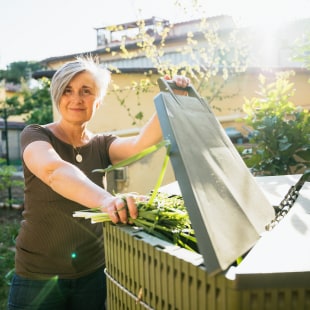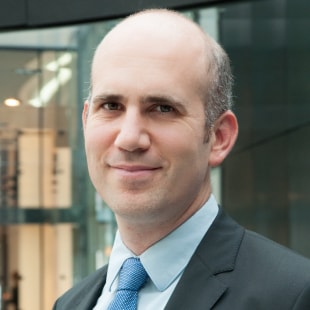Objectives of the Circular Economy
Formerly known only to thinkers and economists at the cutting edge of ecology, the circular economy has now become a common phrase promoted by official programs and legal texts across the world. According to the United Nations, it holds "much promise for the implementation of the 2030 Agenda" of Sustainable Development Goals (Circular Economy for the SDGs: From Concept to Practice). Many countries have passed laws like France's Act of 17 August 2015 on energy transition for green growth. For some countries (e.g. China and Japan), the circular economy is a national development objective.
Many discussions about the circular economy mention the "3 Rs" (reduce, recycle and reuse). But in fact, other verbs could be added to this trio of strategies, like “sort” and “refurbish”... The goal is to move from the linear economy (extract, make, consume, waste) to a model that incorporates the product life cycle and sustainable resource management.
« Many discussions about the circular economy mention the "3 Rs" (reduce, recycle and reuse). »
Why has the circular economy become a public policy objective? Three major factors are summarized below:
- Environment: The planet's resources are limited and our environment has greatly deteriorated, posing a major threat to the quality of life of all living things.
- Economy: At a time when economies have become interdependent, externalized and more exposed to catastrophic risks (e.g. climate disasters and public health crises), the circular economy offers opportunities for bringing jobs back onshore, creating jobs and finding new, positive-impact sources of revenue (e.g. waste recovery and water management).
- Society: Given its modus operandi, the circular economy is a catalyst for change enabling us - via the sharing, usage and recycling economy -to live differently and consume in a more socially responsible and inclusive way.
The forces driving the circular economy
Public authorities
The public authorities provide a legislative framework that supports and organizes the circular economy, gives it visibility and sets specific economic objectives. Many countries and regions of the world have now developed concrete road maps. For instance, France established a road map in 2018 that gave rise to the Law of 10 February 2020 relative to the fight against waste and to the circular economy. This piece of legislation aims to cut resource consumption by 30% by 2030, recycle 100% of plastics by 2025 and create 300,000 jobs. It is consistent with the Circular Economy Action Plan adopted by the European Commission. As noted on the Commission's website, this new action plan indicates the path to follow towards a climate-neutral, competitive economy while ensuring that consumers have their say.
From consumers to contributors
Consumers – and civil society, generally – are a major driver for implementation of the circular economy. The work of think tanks and initiatives all over the world are making it possible. The best known and most influential is the Ellen MacArthur Foundation, founded in 2010. A subsidiary of BNP Paribas, BNP Paribas Leasing Solutions, has joined the Foundation's Circular Economy 100 Programme to create alternatives to the "take, make, waste" model.
In fact, public awareness is on the rise for a number of reasons, such as climate imbalance, global epidemics (e.g. Covid-19), media coverage of Earth Overshoot Day, recurring public health scandals and the fact that pollution is everywhere. More attention is being paid to the depletion of the earth's natural resources and decision-makers in public and private sectors alike are increasingly expected to shoulder their respective responsibilities. For instance, a poor corporate track record on environmental or social issues (according to ESG criteria) can adversely affect a company's financial valuation. On the other hand, certified sustainable investment funds show more stability of performance in times of crisis.
Major economic players
Major companies should lead the way, irrespective of their economic sector. Backed by their financial clout, they have a duty to help bring about change and meet consumer expectations. At BNP Paribas, we express this sense of engagement in different ways. One key lever that we can pull is the financing of business equipment. Leasing is key to the circular economy in the workplace, because it encourages longer use, reuse and recycling of capital goods. Depending on the needs of the business concerned, we provide:
- Rental solutions: Companies turn over management of their end-of-contract equipment to BNP Paribas Leasing Solutions and its industrial partners for resale or for recycling in compliance with current standards.
- Solutions for comprehensive equipment lifecycle management: For instance, BNP Paribas 3 Step IT aims to refurbish and resell 97% of end-of-contract technology equipment, reducing their carbon footprint by 36% by avoiding the production and transport of new materials.
- Mobility solutions: As part of its industrial vehicle management services, BNP Paribas Rental Solutions Trucks provides maintenance that helps extend vehicle life and ensure resale at end-of-contract.
"One of our main objectives – for consumers, businesses and states alike – is to make the most of products and raw materials, minimize waste and preserve the earth's natural resources as much as possible. At BNP Paribas Leasing Solutions, we've been focusing on the circular economy for several years now, striving to give business equipment a second– or even a third – life in every sector possible."
Charlotte Dennery, Chief Executive Officer of BNP Paribas Leasing Solutions
The circular economy has also modified how we do our job on the financial front, giving rise to the offer and implementation of innovative financial solutions tailored to client needs. A case in point is BNP Paribas Easy ECPI Circular Economy Leaders UCITS ETF, an index fund launched by BNP Paribas Asset Management that gives investors access to 50 international stocks from among the largest market capitalizations. The latter are chosen because they are active in the economic model based on the circularity of goods, materials and raw materials. Following a similar rationale, this type of targeted financing is being extended to innovative social entrepreneurship projects.
"In a rapidly changing world, the circular economy will play a major role in safeguarding natural resources and our planet. BNP Paribas supports the transition to a circular economy by financing those who are active in the circular economy and particularly those who innovate; developing its leasing offerings, and taking positive action itself."
Bertrand Alfandari, ETF & Index Solutions, BNP Paribas Asset Management
Social entrepreneurs
Social entrepreneurs start and run enterprises recognized as being of social or environmental utility. These key proponents of the social and solidarity-based economy are taking new approaches that cannot be dissociated from the circular economy, the reason why public authorities and financial institutions like BNP Paribas support them.This sector of the economy is booming and spawning many innovations, according to the Social Entrepreneurship Barometer 2020.
"All these initiatives demonstrate that there are concrete alternatives to the linear economy. Many social enterprises have a good understanding of local territories and needs. They are taking up this topic and enabling individuals or organizations to reduce their resource consumption and waste production. The global transition from a linear economy to a circular economy is only just beginning."
Sébastien Soleille, Group Head of Energy Transition and Environment, BNP Paribas.




